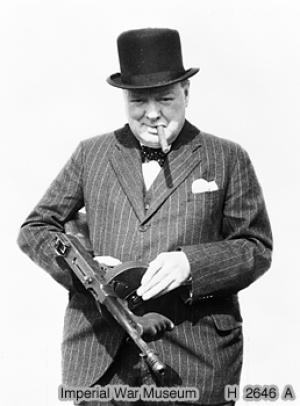Irish Constitution saves sweatshop employers from Winnie

‘Where you have what we call sweated trades, you have no organisation, no parity of bargaining, the good employer is undercut by the worst… where those conditions prevail you have not a condition of progress, but a condition of progressive degeneration’
(Winston Churchill, President of the Board of Trade, introducing the Trade Boards Act to the House of Commons on April 28th, 1909. This was the forerunner of the Joint Labour Committee system)
As Churchill predicted the growing power of employers and dismantling of protection for employees has certainly seen ‘progressive degeneration’ grow apace in Ireland in recent years. The victory of Cork businessman John Grace and his Fried Chicken business in Cork’s appropriately named Cook Street, certainly drove a nail into the legislation designed to prevent sweatshops emerging again in our cities and towns.Winnie gunning for sweatshop employers
Mr Justice Kevin Feeney delivered the Coup de Grace last week in the High Court when he declared sections of the 1946 and 1990 Industrial Relations Acts transposing the British system of wage regulation into Irish law unconstitutional. Poorly drafted, they amounted to ‘an unlawful or disproportionate interference with the property rights’ of employers under some of the more reactionary provisions of the Irish Constitution.
The verdict was not unexpected and the main reason employers never challenged the legislation before now was that the cumbersome mechanisms used to set wages had been a fairly slow process that saved them millions in the decades of economic growth when pay constantly chased inflation. Once the economy began to shrink employers changed their tune and moved quickly to ensure pay cuts.
The crucial defect in the legislation was that while the Constitution allows the Oireachtas to delegate some of its powers to other bodies, neither the Labour Court, nor the Joint Labour Committees set up under the 1946 Act were given clear guidelines – or ‘principles and policies’ as Mr Justice Feeney described them – on how they should apply the powers granted to them when it came to issuing Employment Regulation Orders.
The Judge identified 17 tests that the Act failed to meet under the ‘principles and policies’ criteria. He said that some of the powers granted to the JLCs and Labour Court exceeded those of the Oireachtas itself. For instance, once an Employment Regulation Order was made no employer could appeal it or seek a review for at least six months and failure to implement it could lead to criminal sanctions. He concluded that the JLCs and Labour Court were acting ultra vires, or well beyond the powers envisaged for such bodies in the Constitution. Setting a minimum wage and conditions of employment for any sector of the economy was ‘a delegated power of a most fundamental, permissive and far reaching kind.’
While Mr Justice Feeney outlined in detail the defects in the 1946 and 1990 Acts that needed to be addressed in any new legislation to bring it into line with Article 15. 2.1 of the Constitution he was less forthcoming on how the JLC system infringed Article 40.3.1 covering the personal rights of citizens and Article 43, covering the Rights of Property. He is expected to expand on these when he considers the issue of damages for John Grace Fried Chicken Limited and the Quick Service Food Alliance on July 27th.
There is something seriously wrong with an Irish Constitution that is well to the right of England’s greatest Tory Prime Minister and 100 years behind his thinking on industrial relations.
